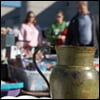All Israel have a share in the World To Come, as it is stated (Isaiah 60:21): 'And Your people are tzadikkim (righteous).' They shall inherit the land forever. They are the branch of My planting, the work of My hands, in which I take pride. (Sanhedrin 90a)
כָּל יִשְׂרָאֵל יֵשׁ לָהֶם חֵֽלֶק לְעוֹלָם הַבָּא, שֶׁנֶּאֱמַר: וְעַמֵּךְ כֻּלָּם צַדִּיקִים, לְעוֹלָם יִֽירְשׁוּ אָֽרֶץ, נֵֽצֶר מַטָּעַי מַעֲשֵׂה יָדַי לְהִתְפָּאֵר.
Moses received the Torah from Sinai and gave it over to Joshua. Joshua gave it over to the Elders, the Elders to the Prophets, and the Prophets gave it over to the Men of the Great Assembly. They [the Men of the Great Assembly] would always say these three things: Be cautious in judgement. Establish many pupils. And make a safety fence around the Torah.
אמֹשֶׁה קִבֵּל תּוֹרָה מִסִּינַי וּמְסָרָהּ לִיהוֹשֻֽׁעַ, וִיהוֹשֻֽׁעַ לִזְקֵנִים, וּזְקֵנִים לִנְבִיאִים, וּנְבִיאִים מְסָרֽוּהָ לְאַנְשֵׁי כְנֶֽסֶת הַגְּדוֹלָה. הֵם אָמְרוּ שְׁלֹשָׁה דְבָרִים: הֱווּ מְתוּנִים בַּדִּין, וְהַעֲמִֽידוּ תַּלְמִידִים הַרְבֵּה, וַעֲשׂוּ סְיָג לַתּוֹרָה.
Shimon the Righteous was among the last surviving members of the Great assembly. He would say: The world stands on three things: Torah, the service of G‑d, and deeds of kindness.
בשִׁמְעוֹן הַצַּדִּיק הָיָה מִשִּׁירֵי כְנֶֽסֶת הַגְּדוֹלָה. הוּא הָיָה אוֹמֵר, עַל שְׁלֹשָׁה דְבָרִים הָעוֹלָם עוֹמֵד: עַל הַתּוֹרָה, וְעַל הָעֲבוֹדָה, וְעַל גְּמִילוּת חֲסָדִים.
Antignos of Socho received the tradition from Shimon the Righteous. He would say: Do not be as slaves, who serve their master for the sake of reward. Rather, be as slaves who serve their master not for the sake of reward. And the fear of Heaven should be upon you.
גאַנְטִיגְנוֹס אִישׁ סוֹכוֹ קִבֵּל מִשִּׁמְעוֹן הַצַּדִּיק. הוּא הָיָה אוֹמֵר: אַל תִּהְיוּ כַּעֲבָדִים הַמְשַׁמְּשִׁין אֶת הָרַב עַל מְנָת לְקַבֵּל פְּרָס, אֶלָּא הֱווּ כַּעֲבָדִים הַמְשַׁמְּשִׁין אֶת הָרַב שֶׁלֹּא עַל מְנָת לְקַבֵּל פְּרָס, וִיהִי מוֹרָא שָׁמַֽיִם עֲלֵיכֶם.
Yossei the son of Yoezer of Tzreidah, and Yossei the son of Yochanan of Jerusalem, received the tradition from them. Yossei the son of Yoezer of Tzreidah would say: Let your home be a meeting place for the wise; dust yourself in the soil of their feet, and drink thirstily of their words.
דיוֹסֵי בֶּן יוֹעֶֽזֶר אִישׁ צְרֵדָה וְיוֹסֵי בֶּן יוֹחָנָן אִישׁ יְרוּשָׁלַֽיִם קִבְּלוּ מֵהֶם. יוֹסֵי בֶּן יוֹעֶֽזֶר אִישׁ צְרֵדָה אוֹמֵר: יְהִי בֵיתְךָ בֵּית וַֽעַד לַחֲכָמִים, וֶהֱוֵי מִתְאַבֵּק בַּעֲפַר רַגְלֵיהֶם, וֶהֱוֵי שׁוֹתֶה בַצָּמָא אֶת דִּבְרֵיהֶם.
Yossei the son of Yochanan of Jerusalem would say: Let your home be wide open, and let the poor be members of your household. And do not engage in excessive conversation with a woman. This is said even regarding one's own wife—how much more so regarding the wife of another. Hence, the sages said: One who excessively converses with a woman causes evil to himself, neglects the study of Torah, and, in the end, inherits purgatory.
היוֹסֵי בֶּן יוֹחָנָן אִישׁ יְרוּשָׁלַֽיִם אוֹמֵר: יְהִי בֵיתְךָ פָּתֽוּחַ לִרְוָחָה, וְיִהְיוּ עֲנִיִּים בְּנֵי בֵיתְךָ, וְאַל תַּרְבֶּה שִׂיחָה עִם הָאִשָּׁה, בְּאִשְׁתּוֹ אָמְרוּ, קַל וָחֹֽמֶר בְּאֵֽשֶׁת חֲבֵרוֹ. מִכַּאן אָמְרוּ חֲכָמִים: כָּל הַמַּרְבֶּה שִׂיחָה עִם הָאִשָּׁה, גּוֹרֵם רָעָה לְעַצְמוֹ, וּבוֹטֵל מִדִּבְרֵי תוֹרָה, וְסוֹפוֹ יוֹרֵשׁ גֵּיהִנֹּם.
Joshua the son of Perachia and Nitai the Arbelite received from them. Joshua the son of Perachia would say: Assume for yourself a master, acquire for yourself a friend, and judge every man to the side of merit.
ויְהוֹשֻֽׁעַ בֶּן פְּרַחְיָה וְנִתַּאי הָאַרְבֵּלִי קִבְּלוּ מֵהֶם. יְהוֹשֻֽׁעַ בֶּן פְּרַחְיָה אוֹמֵר: עֲשֵׂה לְךָ רַב, וּקְנֵה לְךָ חָבֵר, וֶהֱוֵי דָן אֶת כָּל הָאָדָם לְכַף זְכוּת.
Nitai the Arbelite would say: Distance yourself from a bad neighbor, do not cleave to a wicked person, and do not abandon belief in retribution.
זנִתַּאי הָאַרְבֵּלִי אוֹמֵר: הַרְחֵק מִשָּׁכֵן רָע, וְאַל תִּתְחַבֵּר לָרָשָׁע, וְאַל תִּתְיָאֵשׁ מִן הַפּוּרְעָנוּת.
Judah the son of Tabbai and Shimon the son of Shotach received from them. Judah the son of Tabbai would say: When sitting in judgement, do not act as a counselor-at-law. When the litigants stand before you, consider them both guilty; and when they leave your courtroom, having accepted the judgement, regard them as equally righteous.
חיְהוּדָה בֶּן טַבַּאי וְשִׁמְעוֹן בֶּן שָֽׁטַח קִבְּלוּ מֵהֶם. יְהוּדָה בֶּן טַבַּאי אוֹמֵר: אַל תַּֽעַשׂ עַצְמְךָ כְּעוֹרְכֵי הַדַּיָּנִין, וּכְשֶׁיִּהְיוּ בַּעֲלֵי הַדִּין עוֹמְדִים לְפָנֶֽיךָ, יִהְיוּ בְעֵינֶֽיךָ כִּרְשָׁעִים, וּכְשֶׁנִּפְטָרִים מִלְּפָנֶֽיךָ יִהְיוּ בְעֵינֶֽיךָ כְּזַכָּאִין, כְּשֶׁקִּבְּלוּ עֲלֵיהֶם אֶת הַדִּין.
Shimon the son of Shotach would say: Increasingly cross-examine the witnesses. Be careful with your words, lest they learn from them how to lie.
טשִׁמְעוֹן בֶּן שָֽׁטַח אוֹמֵר: הֱוֵי מַרְבֶּה לַחֲקוֹר אֶת הָעֵדִים, וֶהֱוֵי זָהִיר בִּדְבָרֶֽיךָ, שֶׁמָּא מִתּוֹכָם יִלְמְדוּ לְשַׁקֵּר.
Shmaayah and Avtalyon received from them. Shmaayah would say: Love work, loath mastery over others, and avoid intimacy with the government.
ישְׁמַעְיָה וְאַבְטַלְיוֹן קִבְּלוּ מֵהֶם. שְׁמַעְיָה אוֹמֵר: אֱהוֹב אֶת הַמְּלָאכָה וּשְׂנָא אֶת הָרַבָּנוּת, וְאַל תִּתְוַדַּע לָרָשׁוּת.
Avtalyon would say: Scholars, be careful with your words. For you may be exiled to a place inhabited by evil elements [who will distort your words to suit their negative purposes]. The disciples who come after you will then drink of these evil waters and be destroyed, and the Name of Heaven will be desecrated.
יאאַבְטַלְיוֹן אוֹמֵר: חֲכָמִים, הִזָּהֲרוּ בְדִבְרֵיכֶם, שֶׁמָּא תָחֽוֹבוּ חוֹבַת גָּלוּת וְתִגְלוּ לִמְקוֹם מַֽיִם הָרָעִים, וְיִשְׁתּוּ הַתַּלְמִידִים הַבָּאִים אַחֲרֵיכֶם וְיָמֽוּתוּ, וְנִמְצָא שֵׁם שָׁמַֽיִם מִתְחַלֵּל.
Hillel and Shammai received from them. Hillel would say: Be of the disciples of Aaron—a lover of peace, a pursuer of peace, one who loves the creatures and draws them close to Torah.
יבהִלֵּל וְשַׁמַּאי קִבְּלוּ מֵהֶם. הִלֵּל אוֹמֵר: הֱוֵי מִתַּלְמִידָיו שֶׁל אַהֲרֹן, אוֹהֵב שָׁלוֹם וְרוֹדֵף שָׁלוֹם, אוֹהֵב אֶת הַבְּרִיּוֹת, וּמְקָרְבָן לַתּוֹרָה.
He would also say: One who advances his name, destroys his name. One who does not increase, diminishes. One who does not learn is deserving of death. And one who makes personal use of the crown of Torah shall perish.
יגהוּא הָיָה אוֹמֵר: נְגַד שְׁמָא אֲבַד שְׁמֵהּ, וּדְלָא מוֹסִיף יָסֵף, וּדְלָא יַלִּיף קְטָלָא חַיָּב, וּדְאִשְׁתַּמֵּשׁ בְּתַגָּא חֳלָף.
He would also say: If I am not for myself, who is for me? And if I am only for myself, what am I? And if not now, when?
ידהוּא הָיָה אוֹמֵר: אִם אֵין אֲנִי לִי, מִי לִי, וּכְשֶׁאֲנִי לְעַצְמִי, מָה אֲנִי, וְאִם לֹא עַכְשָׁו, אֵימָתָי.
Shammai would say: Make your Torah study a permanent fixture of your life. Say little and do much. And receive every man with a pleasant countenance.
טושַׁמַּאי אוֹמֵר: עֲשֵׂה תוֹרָתְךָ קְבַע, אֱמוֹר מְעַט וַעֲשֵׂה הַרְבֵּה, וֶהֱוֵי מְקַבֵּל אֶת כָּל הָאָדָם בְּסֵֽבֶר פָּנִים יָפוֹת.
Rabban Gamliel would say: Assume for yourself a master; stay away from doubt; and do not accustom yourself to tithe by estimation.
טזרַבָּן גַּמְלִיאֵל הָיָה אוֹמֵר: עֲשֵׂה לְךָ רַב, וְהִסְתַּלֵּק מִן הַסָּפֵק, וְאַל תַּרְבֶּה לְעַשֵּׂר אֻמָּדוּת.
His son, Shimon, would say: All my life I have been raised among the wise, and I have found nothing better for the body than silence. The essential thing is not study, but deed. And one who speaks excessively brings on sin.
יזשִׁמְעוֹן בְּנוֹ אוֹמֵר: כָּל יָמַי גָּדַֽלְתִּי בֵּין הַחֲכָמִים, וְלֹא מָצָֽאתִי לְגוּף טוֹב מִשְּׁתִיקָה, וְלֹא הַמִּדְרָשׁ עִקָּר אֶלָּא הַמַּעֲשֶׂה, וְכָל הַמַּרְבֶּה דְבָרִים מֵבִיא חֵטְא.
Rabbi Shimon the son of Gamliel would say: By three things is the world sustained: law, truth and peace. As is stated (Zachariah 8:16), "Truth, and a judgement of peace, you should administer at your [city] gates.''
יחרַבָּן שִׁמְעוֹן בֶּן גַּמְלִיאֵל אוֹמֵר, עַל שְׁלֹשָׁה דְבָרִים הָעוֹלָם קַיָּם: עַל הַדִּין, וְעַל הָאֱמֶת, וְעַל הַשָּׁלוֹם, שֶׁנֶּאֱמַר: אֱמֶת וּמִשְׁפַּט שָׁלוֹם שִׁפְטוּ בְּשַׁעֲרֵיכֶם.
Rabbi Chananya ben Akashya said: “The Holy One, blessed be He, wished to make the people of Israel meritorious; therefore He gave them Torah and mitzvot in abundant measure, as it is written (Isaiah 42:21): ‘The L‑rd desired, for the sake of his [Israel’s] righteousness, to make the Torah great and glorious.’” (Makkot 23b)
רַבִּי חֲנַנְיָה בֶּן עֲקַשְׁיָא אוֹמֵר, רָצָה הַקָּדוֹש בָּרוּךְ הוּא לְזַכּוֹת אֶת יִשְׂרָאֵל, לְפִיכָךְ הִרְבָּה לָהֶם תּוֹרָה וּמִצְוֹת, שֶׁנֶּאֱמַר: י-י חָפֵץ לְמַעַן צִדְקוֹ יַגְדִּיל תּוֹרָה וְיַאְדִּיר.





Join the Discussion